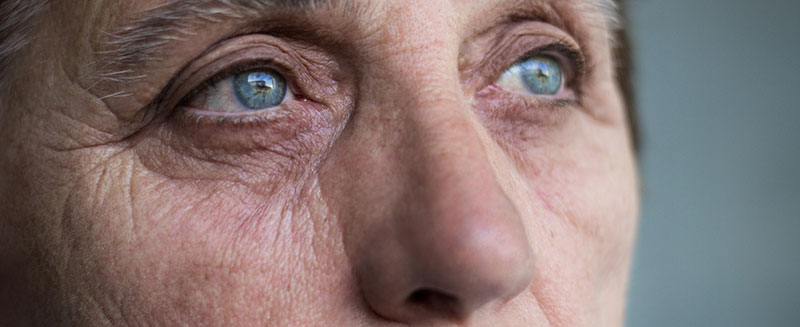
Certain vision problems are common among people with dementia.
The elaborate, complex steps that make it possible for us to see are amazing. In the blink of an eye, our brains can take information sent from our environment, decipher that information according to input from our other senses, experiences, and thoughts and then establish an understanding of the information to make us conscious of what it is we are witnessing.
It’s no surprise then that Alzheimer’s can create vision problems, leading to misunderstandings and visual deficits, especially in the areas of:
- Depth perception
- Color perception
- Contrast
- Movement recognition
- Peripheral vision
As if that were not enough, older adults with dementia may suffer an altered sense of reality in the form of illusions. To illustrate, imagine a person with Alzheimer’s disease or other form of dementia sees a shadow on the floor. The senior might mistake it for something benign, like the family’s pet cat, or a danger, like an intruder. Further types of visual misunderstandings in dementia might include:
- Misinterpreting their own reflections in a window or mirror for another person. This can lead the senior to assume someone else is there, and in the case of a bathroom mirror, may lead the senior to avoid going in when needed, causing discomfort and distress.
- Assuming that images on the television are real and going on in the room.
- Issues with sitting in a chair or on the toilet, fearing they will fall.
- Feeling overwhelmed in overstimulating surroundings that can cause confusion.
- Reaching out for items that are not there, or missing the mark in trying to grab something.
- Problems with eating and drinking.
Try these ideas to assist a senior with dementia who’s challenged by vision problems:
- Make sure there is enough light throughout the home, and take away any items that are creating stress or visual confusion, if at all possible.
- Utilize contrasting colors. For instance, serve a light-colored cream soup in a dark-colored dish.
- Close all window blinds or drapes at nighttime and also whenever the sunlight causes a glare.
- Use adaptive devices like remote controls and telephones with bigger buttons to help enable the senior to maintain self-reliance in spite of visual difficulties.
At Morning Glory Home Care, a provider of dementia care in Alton, IL and the surrounding areas, we are committed to ensuring that the older adults in our care are always safe and thriving. Our highly trained dementia care experts understand the visual and other changes that develop, and are equipped with innovative, compassionate ways to help.
For more information on our in-home dementia care solutions, or to request additional resources related to caring for a senior in the home, call us any time at 618-667-8400.
